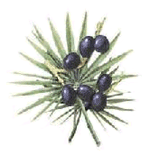
Pygeum
Introduction
This fact sheet provides basic information about Pygeum. Pygeum is an evergreen tree native to African forest regions. It can grow to 150 feet in height. The thick leaves are oblong in shape; the flowers are small and white. Pygeum fruit is a red berry, resembling a cherry when ripe. The bark (red, brown or gray) is the part of the plant used for medicinal purposes. It has a hydrocyanic acid-like odor. Powdered pygeum bark is used by African natives to treat urinary problems.
Common Names
Pygeum, African Plum Tree
Latin Names
Pygeum africanum
What It Is Used For
- Pygeum has been used to improve symptoms of benign prostatic hypertrophy and to improve sexual function.
How It Is Used
Pygeum is available as the standardized preparations Tadenan and Pigenil. It has been studied in clinical trials for benign prostatic hypertrophy at daily doses of 25 to 200 mg.
What the Science Says
- Pygeum clinical trials (mostly European), are encouraging, but more research is needed in the United States. Most trial results report improvement of BPH symptoms. Reduction in gland size and other parameters occur, but are not as profound.
Side Effects and Cautions
- GI irritation has been reported with the use of pygeum.
Sources







